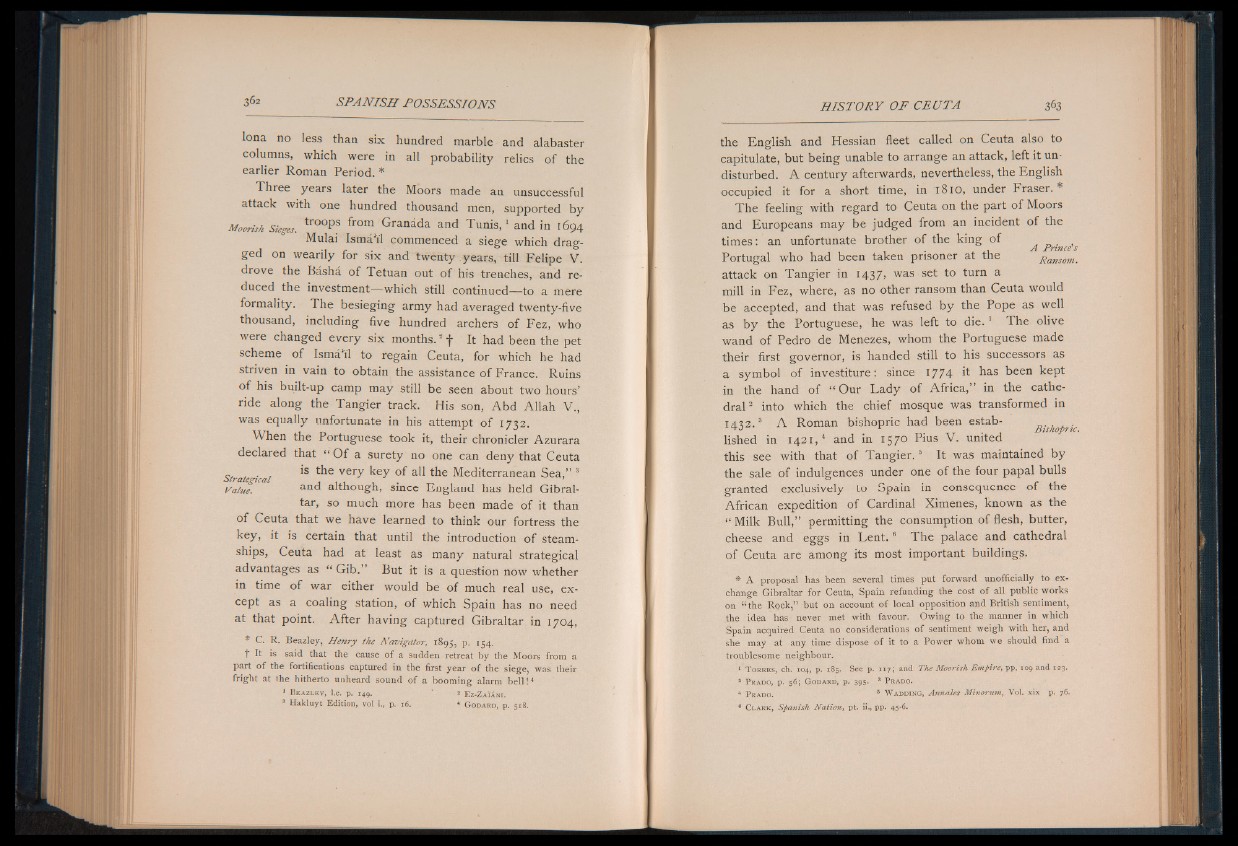
Iona no less than six hundred marble and alabaster
columns, which were in all probability relics of the
earlier Roman Period. *
T h r e e y e a r s late r th e Moors made an unsuccessful
a tta ck with one hundred thousand men, supported b y
Moorish Sieges. trooPs from Granada and T u n is ,1 and in 1694
Mulai Isma‘i'1 commenced a sieg e which d ra g g
e d on w ea rily for s ix and tw en ty y ea rs, till F e lip e V .
dro ve the Basha o f T e tu an out o f his trenches, and reduced
th e investment— which still continued— to a mere
formality. T h e b e s ie g in g a rmy had a v e ra g ed twenty-five
thousand, inc luding five hundred archers o f F e z , who
were chan ged e v e r y s ix m on th s .2 j* It had been th e pet
scheme o f Isma1!'! to regain Ceuta, for which he had
striven in va in to obtain the assistance o f France. Ruins
o f his built-up camp m a y still b e seen about two hours’
ride a lo n g the T a n g ie r track. His son, A b d A lla h V .,
was eq u a lly unfortunate in his attempt o f 1732.
When the Portugue se to o k it, their chronicler A zu ra ra
dec lared that “ O f a su re ty no one can d en y that C eu ta
. *s the v e r y k e y o f all the Mediterranean S e a ,” 3 Strategical . . . , ’
Value. and although, since E n g lan d has held Gib raltar,
so much more has been made o f it than
o f C eu ta th a t w e h a v e lea rned to think our fortress the
k e y , it is certain that until the introduction o f steamships,
C eu ta had at lea st as many natural strategical
ad v an ta g e s as “ G ib .” But it is a question now whether
in time o f war either would b e o f much real use, e x c
ep t as a co a lin g station, o f which Spain has no need
a t that point. A f t e r h a v in g captured Gibraltar in 1704,
* C. R. Beazley, Henry the A'avigator, 1895, p. 154.
t It is said that the cause of a sudden retreat by the Moors from a
part of the fortifications captured in the first year of the siege, was their
fright at the hitherto unheard sound of a booming alarm bell!4
1 B e a z l e y , l.c . p . 149. ' = E z -Za i An i .
3 H a k lu y t E d it io n , v o l i., p . 16 . * G o d a r d , p . 518.
the English and Hessian fleet called on Ceuta also to
capitulate, but being unable to arrange an attack, left it undisturbed.
A century afterwards, nevertheless, the English
occupied it for a short time, in 1810, under Fraser.*
The feeling with regard to Ceuta on the part of Moors
and Europeans may be judged from an incident of the
times: an unfortunate brother of the king of
Portugal who had been taken prisoner at the Ransom.
attack on Tangier in 143 7» was set to turn a
mill in Fez, where, as no other ransom than Ceuta would
be accepted, and that was refused by the Pope as well
as by the Portuguese, he was left to die. 1 The olive
wand of Pedro de Menezes, whom the Portuguese made
their first governor, is handed still to his successors as
a symbol of investiture: since 1774 it has t>een kept
in the hand of “ Our Lady of Africa,” in the cathedral2
into which the chief mosque was transformed in
1432.3 A Roman bishopric had been estab- Bishopric
lished in 14 2 1 ,4 and in 1570 Pius V . united
this see with that of Tangier.5 It was maintained by
the sale of indulgences under one of the four papal bulls
granted exclusively to Spain in consequence of the
African expedition of Cardinal Ximenes, known as the
“ Milk Bull,” permitting the consumption of flesh, butter,
cheese and eggs in L en t .6 The palace and cathedral
of Ceuta are among its most important buildings.
f A proposal has been several times put forward unofficially to exchange
Gibraltar for Ceuta, Spain refunding the cost of all public works
on “ the Rock,” but on account of local opposition and British sentiment,
the idea has never met with favour. Owing to the manner in which
Spain acquired Ceuta no considerations of sentiment weigh with her, and
she may at any time dispose of it to a Power whom we should find a
troublesome neighbour.
1 T o r r e s , ch. 104, p. 185. See p. 117; and. The Moorish Empire, pp. 109 and 123.
2 P r a d o , p. 56; G o d a r d , p. 395. 3 P r a d o .
u P r a d o . 5 W a d d i n g , Annales Minorum, Vol. xix p. 76.
6 C l a r k , Spanish Nation, pt. ii., pp. 45-6.